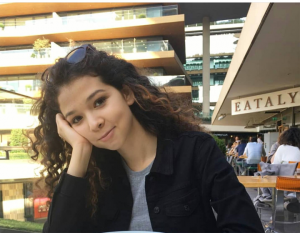
BY ŞEBNEM TÜRE (PSYC/II) sebnem.ture@ug.bilkent.edu.tr
Slow down, you crazy child…
The course registration/add–drop period is now behind us. Every semester, I think long and hard when trying to arrange my schedule, but this time I had even more to consider, because I was trying to decide not only what I would take this semester but also the next one, so that I’ll be able to graduate without any problem.
In addition to that, being a senior often prompts you to think about the future. I guessed it would be like that, but I started to feel it in all its reality only at the beginning of this semester. On the other hand, I remind myself, it’s my last year at Bilkent; I love being here, I like being a student, even though I can’t be on campus due to the pandemic. I want to enjoy this last year, at least in the quiet times when I can take a break from thinking about the coming years and “the rest of my life.”
So what does Vienna have to do with all this? “Vienna” is the title of a song that’s been on my mind lately. It’s featured on the 1977 album “The Stranger” by American soft rock musician Billy Joel. You may know his famous song “Piano Man.” Although “Vienna” isn’t as well known, it is, according to a July 2008 New York Times article, one of the artist’s two favorites among his songs, along with “Summer, Highland Falls.”
The song was inspired by a visit Joel made while in his mid-20s to see his father, who lived in Vienna. This was a city very different from the ones he was used to in America: a city where people seemed calmer, acted as if they knew where they belonged, and weren’t struggling to survive (or at least not that much).
As he walked the streets of Vienna with his father, Joel suddenly noticed that a woman who looked to be around 90 years old was sweeping the streets. When he questioned the situation, his father answered that the woman was at peace, and by continuing to work, felt like she was making a useful contribution to society. This, again, was a different point of view than Joel was used to encountering in America. It made him realize that he could still be useful even when he got old, and suddenly, he was relieved from his worries about aging. In that way, the famous line “Vienna waits for you” came about. The young man realized that in the end, Vienna would always wait for him, that getting old wasn’t going to be that bad – that he didn’t need to be in a hurry for anything, because every stage of life has its benefits and he would be able to contribute to the world at any age.
So, Vienna becomes a metaphor that he uses for “the rest of your life.” It’s in fact a good metaphor for other reasons, too. Throughout its history, Vienna has always been a crossroads for different cultures and empires, a place of exchange (as Joel noted in his interview for the article mentioned above). It’s a place that he believes we’ll all arrive at; it won’t matter what road we’ve chosen. In short, he reminds us all that a Vienna will always wait for us, so it’s pointless to be so hurried and worried while we’re young.
The song therefore comes back to what I said about trying to enjoy the moments I still have at Bilkent this year and not be so occupied with worrying about plans for the future.
I’ve also started to realize why I sometimes focus on the future. Worrying about the future can be tough at times, but you have to admit that there’s also something romantic about it. Dreams, plans, what could be’s, maybes…they all can make you live with your head in the clouds, and sometimes that feels good. There’s an overwhelmingly huge potential ahead, when you think about what the future can bring. That’s also why it’s so easy to think too much about it. Consequently, I can relate to the part of the song that says “it’s so romantic on the borderline tonight,” although the following lines bring me back to reality: “Too bad but it’s the life you lead/ You’re so ahead of yourself that you forgot what you need.”
What we need right now should more often be a question: What do we need at this very moment, for the sake of this moment? We always try to prepare ourselves for “one day.” So, we often try too hard to plan for the rest of our life as if it were something we could miss, like a train. But in fact it’s actually right there in front of us; we don’t need to rush to get to it, we don’t need to run a marathon. As long as we enjoy the journey, it’s somehow going to be okay. We’ll find a place at any age, we’ll find something to do at any age, at least in Vienna. So, the rest of our life, aka Vienna, waits for us. There’s no need to rush; we can slow down.
